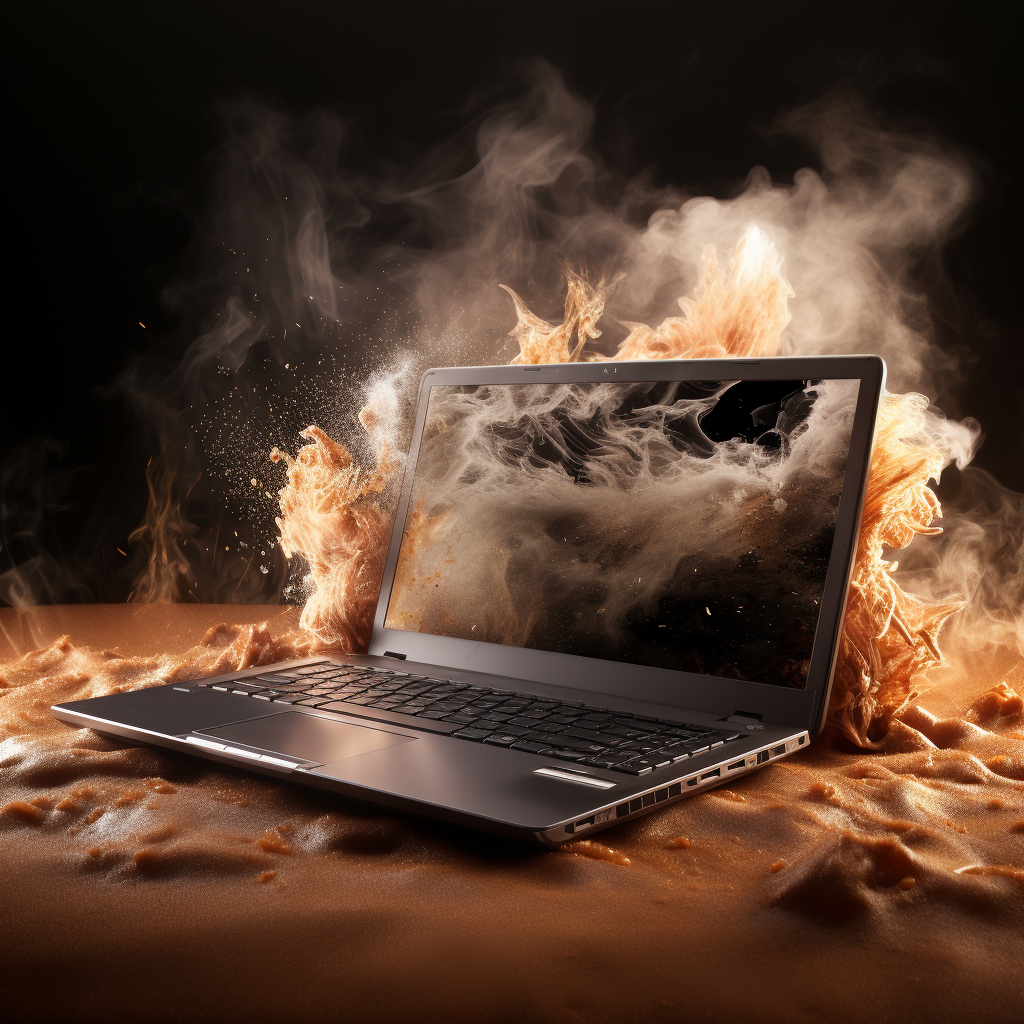Contents
Laptop batteries are designed to provide power to your portable computer, but operating at high temperatures can shorten their lifespan and reduce performance. Excessive heat causes chemical changes inside the battery that reduce its capacity to hold a charge. High temperatures may also trigger safety features that cause a laptop to suddenly shut down before the battery is depleted. Understanding how heat impacts your laptop battery can help you take steps to prevent overheating issues.
This article will provide an in-depth look at how high temperatures affect the internal battery chemistry and real-world performance of laptop batteries. We’ll discuss how the rate of chemical reactions double for each 10°C (18°F) increase in temperature and explain safety features that power down your laptop when the battery gets too hot. Tips will be provided for preventing overheating through proper use, storage, and transport of your laptop. Cooling methods, battery monitoring software, and other steps to reduce high battery temperatures will also be covered. By the end, you’ll understand exactly why extreme heat damages laptop batteries and how to extend their lifespan by keeping your computer’s battery cool.
How Batteries Work
Laptop batteries are rechargeable batteries that store chemical energy and convert it into electrical energy to power your computer when unplugged from AC power. Most modern laptops use lithium-ion batteries because of their high energy density, low self-discharge rate, and lack of memory effect.
A lithium-ion battery contains two electrodes – a positive cathode and negative anode – separated by an electrolyte solution. The cathode is typically made of lithium metal oxide, such as lithium cobalt oxide (LiCoO2) or lithium manganese oxide (LiMn2O4). The anode is usually graphite or another carbon material.
When the battery charges, lithium ions flow from the cathode through the electrolyte to the anode where they are stored. This flow of ions generates a charge imbalance between the two electrodes, creating voltage. When you unplug and discharge the battery, the lithium ions flow back to the cathode, releasing stored energy.
The electrolyte allows lithium ions to travel between the cathode and anode while preventing short circuits. Organic solvents like ethylene carbonate or diethyl carbonate are commonly used as the electrolyte solution.
Charging and discharging a lithium-ion battery relies on electrochemical reactions. The high temperatures can speed up these reactions, but also break down the battery’s components prematurely.

Effect of High Temperatures on Battery Chemistry
The chemical reactions inside a lithium-ion battery are highly temperature sensitive. As a rule of thumb, the rate of chemical reactions doubles for each 10°C (18°F) rise in temperature.
Higher temperatures make the lithium ions move faster between the electrodes. This accelerates both charging and discharging the battery. While this allows the battery to deliver more power for a short time, it also causes faster deterioration over the long-term.
The increased chemical reaction rates affect the battery components in a few key ways:
- The electrolyte solvents break down more rapidly at high temperatures. This reduces their ability to conduct ions between electrodes.
- Accelerated side reactions between the electrolyte and electrodes create more internal resistance. This lowers efficiency and capacity.
- The cathode material becomes oxidized faster, while lithium metal deposits build up on the anode. This leads to permanent loss of active cathode material.
- Passivation films on the anode, which protect against lithium deposition, wear away quicker at higher temperatures. This can result in reduced cycling capacity.
Exposure to temperatures above 30°C (86°F) causes most of these issues to multiply, shortening battery life. Prolonged exposure above 40°C (104°F) is especially damaging. The next section will detail what effects these chemical changes have on real-world battery performance and safety.
Heat Impact on Battery Performance
The chemical changes from high temperatures translate into noticeable impacts on how well your laptop battery performs:
Reduced Runtime – At higher temperatures, the increased chemical reaction rates mean the battery discharges faster. This decreases the length of time you can run the laptop on battery power before recharging.
Faster Capacity Loss – The cumulative damage to electrodes and electrolytes causes lithium-ion batteries to lose capacity at faster rates when regularly exposed to high heat. This is permanent capacity loss, not just temporary performance decline.
Longer Charge Times – Charging lithium-ion batteries also generates heat. Warmer conditions mean the battery takes longer to charge up without overheating. Charging systems may throttle down current to prevent damage.
Sudden Shutdowns – If the battery gets dangerously hot, built-in safety mechanisms will automatically cut off power to prevent catastrophic failure. This causes abrupt, unplanned shutdowns.
Swelling & Deformation – Internal gas pressure from accelerated chemical reactions can cause the battery to swell. High heat exacerbates swelling and may warp or bend the battery packaging.
Reduced Cycle Life – Cycle life refers to the number of charge-discharge cycles a battery can perform before dropping to 80% capacity. Elevated temperatures sharply reduce total cycles over a battery’s lifespan.

Steps to Prevent Overheating Damage
Follow these tips to help keep your laptop battery running cooler and extend its overall lifespan:
- Avoid leaving your laptop in hot environments like cars on sunny days. Even brief exposure to temperatures exceeding 105°F can permanently damage batteries.
- Do not block air vents or run processor-intensive software when using your laptop on soft surfaces like beds or couches. This restricts airflow and causes overheating.
- Periodically clean out dust buildup from internal cooling fans using compressed air. This improves ventilation to reduce operating temperatures.
- Consider using a laptop cooling pad, which can lower laptop surface temperatures by up to 20°C through the use of fans.
- Refrain from completely discharging or charging your battery to 100% where possible. Keeping charge levels between 20-80% reduces chemical stresses.
- Store your laptop battery at around 60% charge in a cool, dry place. Storing in a hot garage or attic accelerates deterioration.
- Update your laptop’s BIOS and battery drivers to ensure the charging system properly throttles current to avoid overheating when approaching full capacity.
- Use battery monitoring software so you can check temperatures and take action if you notice the battery getting excessively hot during use.
- Consider replacing an aging laptop battery if you observe signs of heat damage like reduced runtimes, swelling, or abrupt shutdowns. Higher temperatures accelerate aging.
By being mindful of your laptop and battery temperatures, you can extend the usable lifespan of your battery and avoid disruptive performance issues caused by excessive heat exposure.
FAQs About Hot Laptop Batteries
What temperature is too hot for a laptop battery?
- Most lithium-ion batteries begin to degrade faster at temperatures above 30°C (86°F). Prolonged exposure above 40°C (104°F) causes substantial damage. Damage accelerates rapidly above 50°C (122°F).
What causes a laptop battery to get hot?
- Normal operation generates some heat, but excessive heat usually comes from high CPU/GPU usage, poor ventilation, direct sun exposure, or charging. Defective batteries may also overheat.
Why does my laptop shut down when hot?
- Laptops have a heat sensor that triggers automatic shutdown to avoid battery damage or fire if the battery temperature gets too high. This protects the hardware but causes abrupt interruptions.
Is it safe to use a hot laptop?
- Very high temperatures can pose a fire or burn hazard, but moderately high temps mainly impact battery longevity. Allow cooling before further use if the laptop feels hot.
Should I remove a swollen/hot battery from my laptop?
- Yes, swollen or excessively hot batteries pose safety risks and should be replaced. Carefully remove swollen batteries as damage may cause leakage.
Can I fix an overheating laptop battery?
- If poor ventilation or dust buildup is causing overheating, cleaning and cooling pads may help. But if the battery itself is getting hot, it likely needs professional replacement.
How can I keep my laptop battery cool?
- Avoid heat exposure, ensure proper airflow, use a cooling pad, follow safe charging practices, store properly, and monitor temps with battery software. Replace aging batteries.


